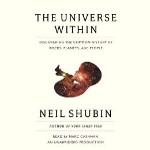AUDIO BOOK REVIEWS
by Jonathan Lowe
 |
Our culture prizes success above all else, but that success
is largely about social status in business, sports, and
the arts. Such success is mostly vain and non-progressive
or static by nature. So that "smell of success"
is more like a sickly sweet stench, while science is more
interested in failure. Why? Because it is failure that propels
science to understand more and to generate better explanations,
according to David Deutsch in THE
BEGINNING OF INFINITY, a landmark book about how
philosophy and religion can deny progress in preventing
ideas from ever germinating. Science is essentially anti-dogma,
and uses failure as a motivator to expand knowledge. "Success"
as defined by culture is meaningless by comparison, since
it reinforces the status quo with rituals and rules that
reward conformity. Deutsch argues that we now live in a
dynamic society, unlike past static societies where individual
thoughts and actions were suppressed. Ideas, and not "Guns,
Germs, and Steel," are therefore what propel history
forward, and so Jared Diamond got it wrong. (Ideas, good
or bad, are memes that replicate themselves like viruses
or computer programs that influence what we do and how we
think.) Deutsch also takes issue with David Attenborough,
whose program on Easter Island praised the skills and artistry
of the long gone inhabitants who built massive stone statues,
and drew the conclusion that their misuse of resources led
to starvation and extinction in much the same way that we
do in relation to the Earth today. But Deutsch points out
that their deforestation, in pursuit of statue building,
was not a microcosm of today, but rather the result of their
society being static. Doing anything else simply did not
occur to them. Forest husbandry was not an idea they imagined.
Even their statues were all alike, with the same gaunt faces
and no creativity in their design. As they began to starve,
their statue building only increased in magnitude, as though
to appease the gods right up to the end. Many of the biggest
statues remain half completed in quarries, when there were
no logs left to transport them. Conversely, the ideas of
individuals such as Albert Einstein or Steve Jobs transformed
the entire 20th Century in different ways. And Deutsch's
premise is that there is no limit of ideas to solve whatever
inevitable problems arise. Only static thinking has a limit,
and that is extinction itself. As read by Walter
Dixon, this profound and densely reasoned book
turns political and sociological dogmas on their head, revealing
their illogical conclusions. Knowledge and the spread of
ideas is not just power, it is the key to the past and the
future. |
|
 |
The insurance model of health care is broken, according
to David Goldhill in CATASTROPHIC
CARE - How American Health Care Killed My Father,
And How We Can Fix It. "There are many perverse incentives,"
Goldhill says, "that are bankrupting the system."
The book arose from an article the author wrote for The
Atlantic magazine after his father died of infections acquired
in a New York hospital in 2007. Amazingly, Medicare paid
the bill in full for his father's treatments of several
hundred thousand dollars, after the hospital first failed
and then failed again (the patient died.) Goldhill then
went on to research the problems within the health care
system, asking how it could be that common medical errors
coupled with unnecessary (or wrong) tests are considered
"normal" by a public which seems to accept the
continually rising prices of hospital or doctor visits as
"inevitable." We shout when gas prices rise 10%,
he says, but say nothing when, say, the simple pulling of
a tooth goes up over 100% since one's last visit (as it
did for this reviewer.) America spends $2.5 TRILLION per
year on health care, more than any other country by any
measure (per capita included.) This rise in costs is unsustainable,
yet both Republicans and Democrats bat around the same old
ideas that are not solutions, but simply more nails in a
coffin that will delivered to everyone long before their
actual death. Narrated by the listenable
Dean Sluyter, the book shows why the insanity
of making insurance pay for everything, (not just catastrophic
care,) needs to be changed before the truly inevitable occurs---which
is the collapse of the system. "Insurance for everything
medically related has resulted in more procedures, higher
costs, lower quality of care, and more paperwork. It's a
lose-lose." Ironically, if one compares technology
in consumer computers to technology in health care, home
computers are cheaper and faster while health care technologies
are more expensive and slower. Why? The system (whether
Obamacare or the Republican model) is rigged to reward inefficiency.
In no other business or enterprise do we pass out bonuses
and paychecks based on how much was wasted that week. "We
have all bought into this model, and it has to end."
Goldhill tells how as well as why, along with nightmare
examples of what happens to real people caught in the cogs
of a berserk machine fueled by insurance premiums instead
of prevention and accounting. |
|
 |
Years ago there was a PBS series on the connections between
events and discoveries or inventions which seem unrelated.
The nature of science is such that progress is not achieved
in a straight, progressive timeline. Random events spark
ingenuity and insight. A and B sometimes does not lead to
C but rather to G or T. Stagnation can last for generations.
In an examination of how we are connected to the base materials
(chemicals) of which we are made, Neil Shubin
presents a series of essays titled THE UNIVERSE
WITHIN: Discovering the Common History of Rocks,
Planets, and People. Read by Marc Cashman,
the book covers the entire history of the universe in an
easily understood and personably performed format. From
the evolution of the solar system to continental drift…to
ice ages and global warming…and to how animals and
plants have adapted within complex environmental structures,
Shubin provides a broad view of essential science and biology
for those who might feel overwhelmed with more technical
material. (6 1/2 hours unabridged)
|
|
 |
After
hearing TENTH
OF DECEMBER by George Saunders, I again wondered
when exactly it was decided that an anagram of the word
"hits" could not be spoken in polite society,
while the word "feces" is acceptable. Here's a
book which makes light of that fact in a series of short
stories that some reviewers might be tempted to call "off
the wall" and "screwball." The F word is
used here a lot, too, but this is far from your typical
humor book or text for some stand-up routine featuring low-brow
bathroom jokes. Saunders is more like the female version
of Jenny Lawson, but with even greater access to those regions
of the brain which are mysterious and quixotic and imaginative.
Wit is not the only thing in his arsenal, either. And this
comes through in his narration. There are serious stories
as well, with a profundity of insight present. The author
takes chances with both technique and subject matter, imbuing
his characters with rich internal lives in the process.
Not surprisingly, Saunders teaches creative writing, and
has won a MacArthur Genius Grant. What makes these stories
work is their surprise, too. . . especially considering
how the typical Hollywood mindset of most writers have them
creating predictable thrills featuring shallow villains.
The author also reads his own stories here, and adds colors
and flavors to his performance that seem strikingly honest
while being quirky. So, for those who believe that "different"
is not a derogatory word (and I am one of them), this collection
is well worth the price of admission. |
|